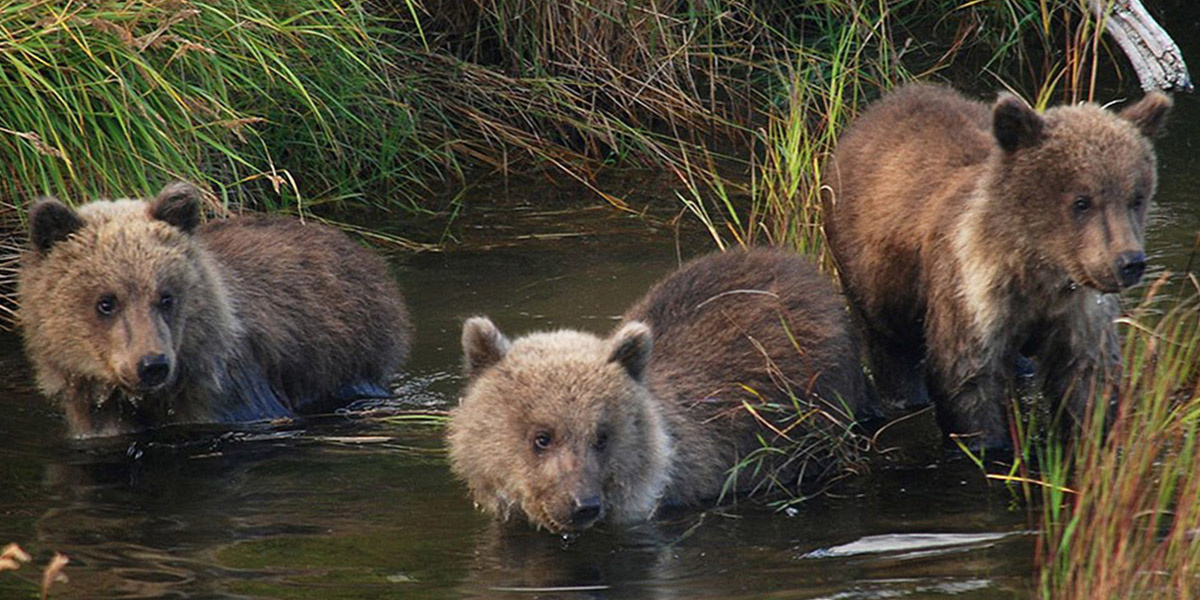
Trump Admin. Wants to Reinstate ‘Cruel’ Hunting Tactics in Alaska, Conservation Groups Say

The Trump administration has proposed new regulations to overturn an Obama-era rule that protects iconic predators in Alaska’s national preserves.
Wildlife protection organizations condemned the move, as it would allow hunters to go to den sites to shoot wolf pups and bear cubs, lure and kill bears over bait, hunt bears with dogs and use motor boats to shoot swimming caribou. Such hunting methods were banned on federal lands in 2015 that are otherwise permitted by the state.
The proposed rule, posted Tuesday in the federal register and pushed by Interior Secretary Ryan Zinke, “would remove a regulatory provision issued by the National Park Service (NPS) in 2015 that prohibited certain sport hunting practices that are otherwise permitted by the State of Alaska.”
Members of the public are invited to post comments on the proposed rule by 11:59 p.m. EST on July 23, 2018.
The Alaska Department of Fish and Game was “pleased to see the National Park Service working to better align federal regulations with State of Alaska hunting and trapping regulations,” Maria Gladziszewski, the state agency’s deputy director of the Division of Wildlife Conservation, said in an email to The Associated Press.
She added that the proposal is “progress in that direction, and we appreciate those efforts. Alaskans benefit when state and federal regulations are consistent.”
NPS said lifting the prohibitions would increase hunting opportunities on national preserve land, which follow Sec. Zinke’s two orders last year.
Safari Club International, a hunting advocacy group, backed the Interior’s new proposal. Zinke, an avid hunter himself, created his International Wildlife Conservation Council that is mainly comprised of trophy hunters and members of the Safari Club, who advocate for federal programs that support hunting.
Conservation groups expressed outrage over the Trump administration’s proposal. They contend Alaska’s predator-control activities are intended solely to artificially inflate game populations, such as moose, for human hunting.
“The Trump administration has somehow reached a new low in protecting wildlife,” said Jamie Rappaport Clark, president and CEO at Defenders of Wildlife, in a statement issued to EcoWatch. “Allowing the killing of bear cubs and wolf pups in their dens is barbaric and inhumane. The proposed regulations cast aside the very purpose of national parks to protect wildlife and wild places.”
She added, “The National Park Service should not accept Alaska’s extreme predator control program as a suitable method of managing wildlife and their habitat.”
“The proposed rule sounds nothing like the Park Service I know,” said Phil Francis, chair of the Coalition to Protect America’s National Parks and a retired NPS veteran with more than 40 years of experience with the agency. “Under the Organic Act of 1916, the National Park Service is mandated to conserve wildlife, not exploit it through these despicable hunting practices. You don’t have to be an avid hunter to know that killing bears with cubs in their dens or shooting swimming caribou from a moving motorboat are simply wrong.”
The Humane Society blasted the Trump administration for reinstating “cruel” hunting practices in Alaska and is urging the public to help keep the prohibitions in place.
“Last year, when the state of Alaska and Safari Club International sued NPS to invalidate this crucial rule, the Humane Society of the United States intervened in the lawsuit to defend the rule and similar rules issued by the U.S. Fish and Wildlife Service,” the group said.
“Now, in a new ploy, the NPS is claiming that due to secretarial orders issued by Department of the Interior Secretary Ryan Zinke to expand hunting opportunities on federal lands and improve coordination with states, the agency is required to rescind these protections. In reality, the agency and Zinke have no authority to override Congressional protections for these federal lands.”

 233k
233k  41k
41k  Subscribe
Subscribe 